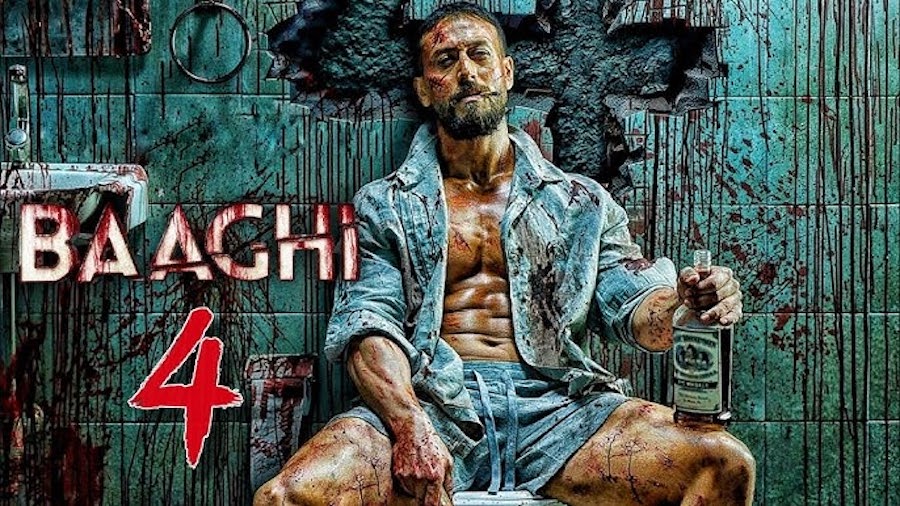Baaghi 4, directed by A Harsha, is an unofficial remake of the Tamil thriller Ainthu Ainthu Ainthu (2013). It, once again, thrusts Tiger Shroff into a familiar template of a lone man on a mission, guided only by his instincts. While the film delivers its quota of fights, blood and dances, nothing quite comes together to make it work.
Ronny (Tiger Shroff) survives a fatal car accident that claims the life of his girlfriend, Alisha (Harnaaz Sandhu). As he recovers, his brother Jeetu (Shreyas Talpade) grows concerned over Ronny’s erratic behaviour and consults a doctor, who diagnoses him as suffering with hallucinations. As the days pass, Ronny becomes increasingly aggressive, mourning Alisha’s death, only to be told that she never existed at all. Even Jeetu insists on this version of reality. To ease his pain, Jeetu hires an escort, Olivia (Sonam Bajwa), who gradually develops a soft corner for Ronny. Yet, Ronny clings to the conviction that his memories of Alisha are real and is determined to get down to the bottom of it all.
Baaghi 4 is the kind of film that only a producer who has also written the story and screenplay himself would dare to finance. Sajid Nadiadwala, to his credit, seems convinced of its cleverness. The film, however, is far less smart than it pretends to be. It piles on twists and secret identities with mechanical regularity, logic be damned. The earlier entries in the franchise, all remakes of Tamil and Telugu films, were no masterpieces either. But at least, they managed some emotional stakes and a proper buildup to the action. Here, the film runs on the reckless belief that rules don’t matter and anything goes. The action scenes, while grand in staging, are stale in inspiration, borrowing heavily from other films. For a franchise remembered for its action, here, even that fails.
For us to empathise with Ronny, we need to be hooked by the moments he shares with Alisha. Yet the so-called romantic interludes are dated, weighed down by sloppy, saccharine-drenched dialogue, and stitched together like a highlights reel. The chemistry between the leads is strikingly low-key, and the inclusion of Olivia, too, feels equally half-hearted. These moments should have been organically developed to give the film some of its most charming passages. But they never do. Even at a runtime of one hour and fifty-seven minutes, the pacing feels rushed, as if every scene is in a sprint.
To make things worse, Sanjay Dutt never rises to that stature of a strong adversary. He lacks menace, and his devilish outbursts register more as noise than as a genuine threat. The script grants him no shading beyond the cliché of a bereaved man lashing out, chopping people, and making bombastic declarations. By the time the inevitable showdown arrives, we feel no investment in his fate. His defeat is neither cathartic nor tragic.
Tiger Shroff remains committed to the physical demands of the role. It is a shame the film does so little to harness his physical presence and his unmistakable sincerity. Harnaaz Sandhu is saddled with a dual role and fails to do justuce to either. As Alisha, she resembles a character lifted straight from a television soap, and as Avantika, meant to be a perilous femme fatale, her efforts feel forced. Sonam Bajwa as Olivia and Shreyas Talpade as Jeetu barely register despite reasonable screen time, thanks to the extremely weak writing. Saurabh Sachdeva, usually a reliable screen presence, is given perhaps the most cringeworthy role of his career, while Upendra Limaye, as a police officer, is reduced to a caricature. And as mentioned above, Sanjay Dutt delivers a performance so exaggerated, so thunderously hollow, that it drains the film of whatever fright the character might have carried.
On the technical front, the film finds little redemption. Swamy J Gowda’s cinematography favours gloss over grit, dressing up the action in slick visuals but rarely capturing a sense of place or urgency. The editing by Kiran Gowda and Nitin Pathak cuts so quickly between scenes that coherence is lost. The score by Sanchit and Ankit Balhara, meant to heighten tension, relies instead on sheer volume.
In the end, Baaghi 4 is both exhausting and pointless, feeling like having being brewed from tea leaves steeped far too many times from the earlier entries of the franchise, losing taste and flavor with each entry. It is high time the filmmakers consider making some fresh tea if they want the franchise is to continue.
Hindi, Action, Romance, Color


